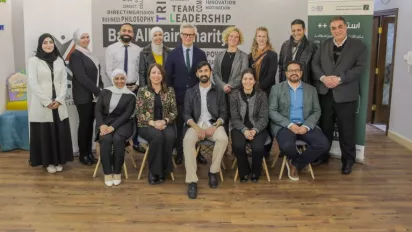
Crisis migration
Fragility, conflict and disaster drive forced displacement. Through the years, unresolved conflicts and the lack of durable solutions has led to protracted displacement for many refugees and other forcibly displaced persons (FDPs).
Displacement is disruptive to employment and livelihoods. A range of factors, such as socio-economic conditions of the host country, legislation and policies around the protection of refugees and their right to work, as well as other practical issues mediate the access to the labour market and decent jobs. Faced with many barriers, refugee workers are often concentrated in low-skilled informal employment or under-regulated sectors where they are susceptible to precarious conditions and decent work deficits.
75% of refugees are in low- and middle-income countries and 66% are also in protracted situations (UNHCR Global Trends Report, 2023). While an estimated 67% of refugees have full access in law to the labour market, 45% of refugees live in countries with unrestricted access in practice to formal employment, including wage-earning jobs or self-employment. (Global Compact on Refugees Indicator Report, 2023).
114 million
people forcibly displaced worldwide mid 2023
36.4 million
refugees worldwide & 71.1 million internally displaced persons
6.1 million
asylum seekers & 5.3 million other people in need of international protection
ILO Response
The ILO has engaged in the labour aspects of forced displacement since its inception and focuses on ensuring access to decent work for both refugees and host communities. Its work is grounded in a comprehensive rights-based framework notably including the ILO Guiding Principles on the Access of Refugees and Other Forcibly Displaced Persons to the Labour Market (2016) and the Employment and Decent Work for Peace and Resilience Recommendation, 2017 (No. 205).
Working closely with governments, workers and employers' organizations, ILO interventions have aimed to:
- Strengthen policy and regulatory frameworks enabling access to labour markets and decent work, including social protection, for refugees.
- Create jobs and promote the transition to the formal economy.
- Boost employability and entrepreneurship among refugees and host communities, e.g., through skills development and recognition, financial and digital inclusion.
Regional responses
The ILO has stepped up its engagement in the wake of the Syrian refugee response, most notably in Türkiye as well as in Jordan and Lebanon. Other geographical areas where the ILO has recently been most active in this topic include the Horn and North of Africa and in response to the crisis in Venezuela and Ukraine.
ILO-UNHCR Partnership
In 2016, an agreement was signed by the ILO and UN High Commissioner on Refugees (UNHCR) to expand their longstanding collaboration to create durable solutions for refugees, other FDPs, and host communities. The third Joint Action Plan for 2023-2025 is currently in place to advance the institutional partnership and establish shared goals and priorities.
The ILO 101 Guide was created to further elaborate on the ILO’s mandate, approach and activities related to supporting decent work in refugee and other forced displacement contexts.
Latest news

Second Phase of PROSPECTS Launched in Ethiopia, Empowering Refugees, IDPs and Host Communities

Norwegian Ambassador visits Jordanian NGO to witness the positive impact of Estidama++ program on workers and employers

Meaningful youth engagement
Empowering Ethiopian youth: ILO Youth to Youth Fund winners announced
Standards and guidance

Employment and Decent Work for Peace and Resilience Recommendation, 2017 (No. 205)

Publications
Digital labour platforms in Kenya: Exploring women’s opportunities and challenges across various sectors
Strategy on the Extension of Social Protection Coverage to Workers in the Informal and Rural Economy in Kenya
Work Wise Youth: A guide to youth rights at work
ILO’s support to Syrian refugees and host communities
Employment and decent work in the Humanitarian-Development-Peace Nexus
Digital refugee livelihoods and decent work - Towards inclusion in a fairer digital economy [Full report]
Employment and decent work in refugee and other forced displacement contexts
Brochure
ILO’s support to refugees and host communities in Turkey
Final Report: Improving Livelihood Opportunities for Refugees and Local Youth in Indonesia
Lessons learned from the ILO’s Refugee Response Programme in Turkey - Supporting livelihood opportunities for refugees and host communities
Lessons Learned and Emerging Good Practices of ILO’s Syria Crisis Response in Jordan and Lebanon
Decent work for migrants and refugees
From Fragility to Resilience through Decent Work in Africa
Refugees - social inclusion and integration into the labour market
Impact of Syrian refugees on the Jordanian labour market
Trainings

1 April – 3 May 2024
Access to decent work for refugees and other forcibly displaced persons
Related videos
ILO training provides refugee with tools to start his own company
ILO in action: Entrepreneurship skills for Venezuelan migrants and refugees
Vocational training: A dream fulfilled against the odds
A new chance at employment for Syrian refugees in Jordan
ILO helps Lebanese farming communities hosting Syrian refugees

COVID-19 response in displacement contexts


